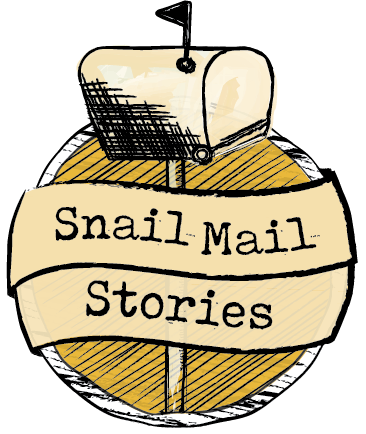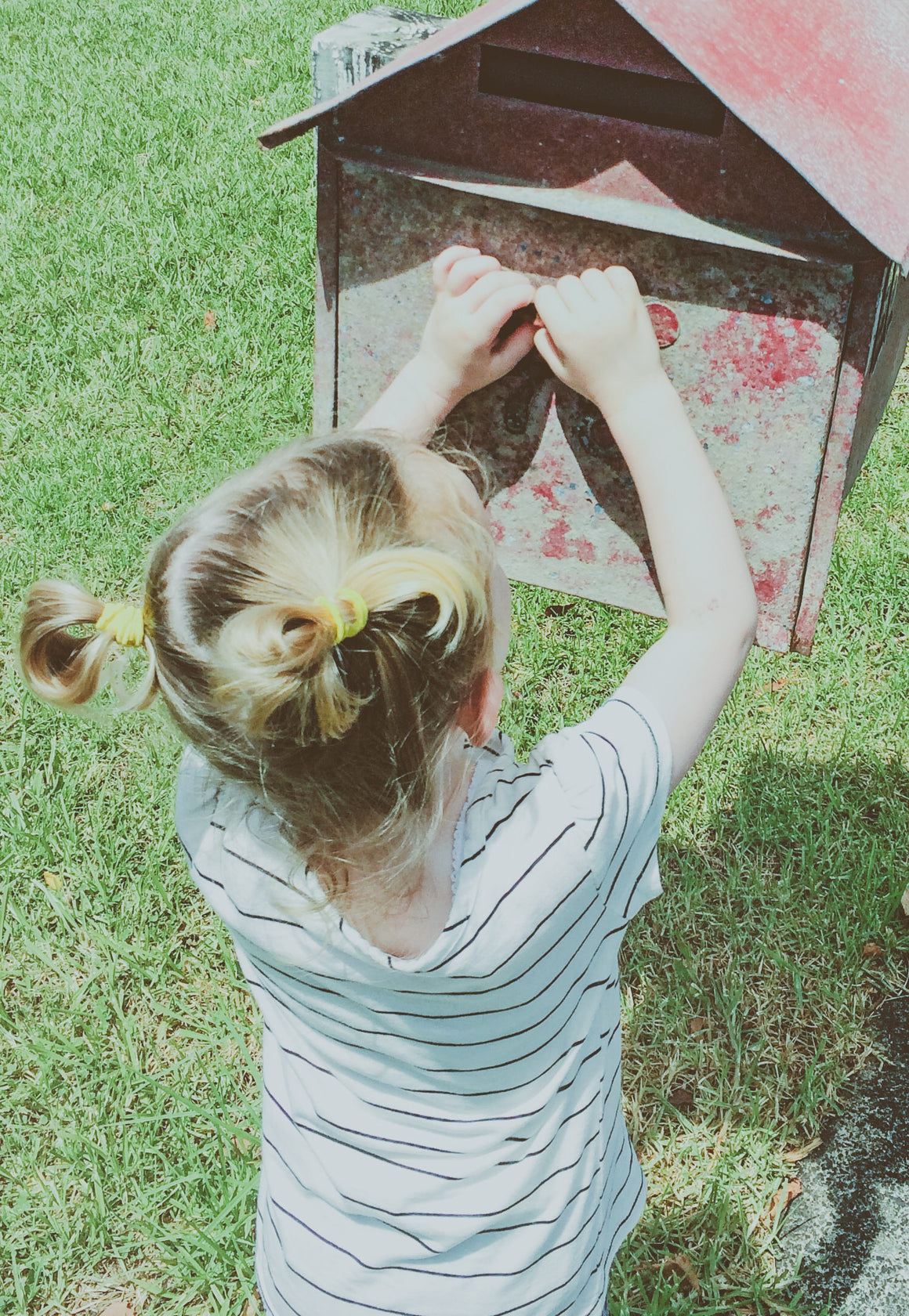
What is Slow Parenting? | An introduction to the Slow Parenting approach
Forever rushing around? Not enough hours in the day? Are you over the frantic frenzy of life? Perhaps Slow Parenting holds the key to finding the holy grail we all seem to seek....a quality life with more time and balance.
In this article:
What is Slow Parenting?
Why has the Slow Parenting become so popular?
The benefits of the Slow Parenting approach
Slow Parenting - Inspiration from times gone by?
Slow Parenting - Is it for you?
How to be a 'slow down parent' - The ABC of Slow Parenting
How can Snail Mail stories help your family to slow down?
What is Slow Parenting?
Carl Honore first coined the phrase in his book, ‘Under Pressure’ in 2008. Slow parenting, in a nutshell, is all about letting children live slower-paced and simpler lives, so they can discover the world at their own pace.
It’s about stepping back to allow kids to work things out for themselves, play freely, and not rely too much on instruction from others.
It’s about slowing down to find time to enjoy the magical moments childhood offers and seeing the value of making meaningful connections rather than focusing on consumer goods and services.
Let children discover the world at their own pace

Why has the Slow Parenting approach become so popular?
Word of mouth
The Slow Parenting movement (also called Simplicity Parenting) has rapidly gained popularity in recent years. A plethora of popular books, blogs and podcasts generated a conversation on the topic. The outcome - more and more people are opting into the concept of slow and simple.
A reaction to fast
Slow Parenting is a reaction to our fast-paced lives. Both parents work in most New Zealand families. The working week is long - the 40 hour working week seems to be a thing of the past. We have less opportunity to switch off due to smartphones and IPads. Commuting times are longer.
Our children may attend numerous extra-curricular activities. Not to mention we still need to perform our household duties and take care of our children - wash them, feed them, educate them, make them feel loved!
It’s no wonder many families are left feeling overwhelmed, exhausted, and like their lives are in constant chaos.
Many families are left feeling overwhelmed, exhausted, and like their lives are in constant chaos
A reaction to the 'Helicopter Parent'
Foster Cline and Jim Fay first coined the phrase ‘Helicopter Parent’ in 1990 to describe mothers and fathers who were “over-involved” in their children's lives. They over-schedule their children in activities and involve themselves in all aspects of their child's life, hoping to give their child the greatest chance to be the best they can be.
Whilst Helicopter Parenting comes from a good place many experts now argue that this approach puts too much pressure on a child. It also doesn't give kids the time and space they need to work things out for themselves, or to find out who they are.
It had also been suggested that Helicopter Parents, drained by their mammoth efforts, miss opportunities to slow down and simply connect with their children in intimate and meaningful ways.

Helicopter Parenting doesn't give kids the time and space they need to work things out for themselves
The benefits of Slow Parenting
Supporters of Slow Parenting say it takes the stress out of parenting, there kids have less meltdowns caused by being overtired. They believe that their child's experience of growing up is a calmer, more positive and connected experience. Kids grow up quickly, those who have adopted the Slow Parenting style tell us they savor special times with their children and really getting to know them as individuals. They find parenting less draining and more enjoyable. Slow down parents also say that by stepping back, to allow their kids to have free time and free play, their children are developing future-focused skills such as self-direction, innovation and creativity.
Take the stress out of parenting

Slow Parenting - Inspiration from times gone by?
The idea of a family living simply and slowly is not a modern concept. If anything, in days gone by, it was perhaps the norm. At some point, perhaps among the greed of the 1980's or the conspicuous consumption in the 90's, this lifestyle seems to have been replaced. However, many people in today’s society are now wondering why this happened and at what cost.
At some point, perhaps among the greed of the 1980's or the conspicuous consumption in the 90's, this lifestyle seems to have been replaced
Slow Parenting - Is it for you?
A decade ago Slow Parenting was seen as an alternative parenting approach. Today its fundamental ideas seemed to have entered mainstream psyche. Parents are cutting back on plastic toys and no longer scheduling numerous co-curricular activities. Art and crafts using sustainable materials, playing with wooden toys, outdoor nature play and simply hanging out as a family are now desired pass times.
Outdoor nature play and simply hanging out as a family are now desired pass times

The ever-increasing pace of life, and the integration of technology in our day-to-day existence, has resulted in many parents making the choice to unplug and choose time, quality experiences, and meaningful connection over acquiring wealth and material goods.
More and more parents are also choosing to adopt the Slow Parenting approach due to the current environmental issues we face, which has led to the understanding that less is more.
Parents are also more aware of the benefits the Slow Parenting approach brings as future-focused educators emphasis the importance of kids developing a new skill set in our rapidly changing world - one that requires self-direction, innovation and creativity.
If you like the idea of recapturing a slower, simpler existence adapted for 21st century living then maybe trying out some of the ideas behind Slow Parenting appeals?
Many parents making the choice to unplug and choose time, quality experiences, and meaningful connection over acquiring wealth and material goods

How To Be A 'Slow Down' Parent - The ABC of Slow Parenting
A - Activities
Slow down family life by reducing the amount of scheduled actvties for your children.
B - Buy Less
To be able to work less and slow down your life decrease your financial demands by turning your back on excessive consumerism
C - Connection
Slow down so you can spend more time connecting with others. Show an interest in and gain an understanding of others people's lives, your community, your culture and the world in general to be able to make meaningful connections.
D - Decision Making
Step back and allow your child to make some of their own decisions.
E - Explore
Give your child the time and space to explore their world at their own pace.

F - Family & Friends
Slow down and spend more time with family and friends, embrace your relationships with these special people and recognize how important they are.
G - Go Outside
Encourage your kids to simply go outside and play, to make their own fun, to play with others.
H - Happy
Slow down, relax, fill your house with fun and laughter.
I - Idle
Be an idle parent, leave your kids alone, don't feel guilty about putting your feet up.
J - Just sit there
Slow down, be in the moment, be in the present. Don't think about yesterday or tomorrow. Just sit, be, see and feel the world around you.
K - Kick up leaves
Slow down, spend more time as a family outside, embracing nature and feeling connected to the world in general.

L - Love and laughter
Slow down, enjoy life, work out what really matters.
M - Make things
Give your child simple materials to play with and watch them imagine, create and enjoy.
N - No!
Slow down, learn to say no more often so you can say yes to family time.
O - Obstacles
Let children overcome some of their own problems.
P - Play Pretend
Encourage your child to use their imaginations rather than give them too many toys that do the work for them.

Q - Quit striving for perfection
Slow down, reconsider your to do list, embrace mess. Don't push towards an imagined, perfect future but love the moment your in, be grateful for what you have right now.
R - Risks
Let your children take some risks and learn from their mistakes.

S - Sense of Identity
Give your child the time and space to work out who they are, not what you want them to be. Celebrate their uniqueness.
T - Time
Slow down, work less, remember time is more important than money.
U - Unplug From Technology
Let your child play more naturally, restrict the time spent watching TV and using other technologies, or unplug from technology all together!

V - Vanquish your inner critic
The one who thinks you need to be doing more to 'succeed'. You will never satisfy her. So don't even try. Instead reconsider your definition of success.
W - Work Less.
Spend Less. Live More.
X - eXpectations
Don’t place impossible expectations on your child, they are not a trophy or a project, they are themselves, give them enough comfort to be themselves and watch them fly.
Y - You, in the here and now
Enjoy (and it's ok to enjoy yourself and do things for you, guilt free!)
Z - Zzzzzzzzz
Slow down, take every chance you have. Lie in bed, have a nap, guilt free! We are all happier when we are not tired. It's not just babies who get grizzly.

How can Snail Mail Stories help parents to slow down?
Snail Mail Stories was born out of the desire of a busy mother to find a way to slow down and enjoy quality time with her daughter.
She saw how excited her child got when she received an envelope in the post one morning. Such a simple thing, and yet - the envelope prompted them to stop what they were doing, snuggle up and explore the contents together - a mini adventure! The value of introducing snail mail into a child’s life was realised.


Our monthly envelopes are delivered to your door and contain all the bits and bobs your child needs for their mini adventure. Receiving our envelopes prompt whanau to slow down and connect.
Receiving our envelopes prompt whanau to slow down and connect



Our open-ended questions and hands-on crafts and activities encourage kids to unplug and discover the world around them, in their own way, at their own pace. Our nature-based themes, plastic free contents and focus on up-cycling teaches kids to learn and play in a sustainable way. We foster a love of reading and writing and our two-way pen pal service adds a meaningful and personal touch.



Tempted to give Slow Parenting a try? If so, good luck in your new adventure!
Check out our subscription service.
Also in Snail Life - A Slow Parenting Blog

Gifts for kids - that encourage simple, natural play




Karen Rewcastle
Author